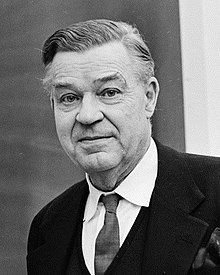Gunnar Myrdal
Appearance
Gunnar Myrdal | |
|---|---|
 Gunnar Myrdal in January 1964 | |
| Born | Karl Gunnar Myrdal 6 December 1898 Skattungbyn, Orsa Municipality, Sweden |
| Died | 17 May 1987 (aged 88) Danderyd, Sweden |
| Nationality | Swedish |
| Alma mater | Stockholm University |
| Known for | Monetary equilibrium, Circular cumulative causation |
| Spouse | |
| Awards | Nobel Memorial Prize in Economic Sciences (1974)[1] Bronislaw Malinowski Award (1975) |
| Scientific career | |
| Fields | Economics, Politics, Sociology |
| Institutions | NYU, Stockholm University |
| Doctoral advisor | Gustav Cassel |
| Doctoral students | Rudolf Meidner |
| Influences | Knut Wicksell John R. Commons[2] Raúl Prebisch |
| Influenced | Ha-Joon Chang G. L. S. Shackle |
Karl Gunnar Myrdal (Swedish: [ˈmyːɖɑːl]; 6 December 1898 – 17 May 1987) was a Swedish economist and sociologist. In 1974, he received the Nobel Memorial Prize in Economic Sciences with Friedrich Hayek for their work in the theory of money and economic fluctuations.[1] He was best known in the United States for his study of race relations, which is seen in his book An American Dilemma: The Negro Problem and Modern Democracy.
Related pages
[change | change source]References
[change | change source]- ↑ 1.0 1.1 "The Sveriges Riksbank Prize in Economic Sciences in Memory of Alfred Nobel 1974". NobelPrize.org. Retrieved 2009-11-27. [dead link]
- ↑ Walter A. Jackson, Gunnar Myrdal and America's Conscience: Social Engineering and Racial Liberalism, 1938–1987, UNC Press Books, 1994, p. 62.
